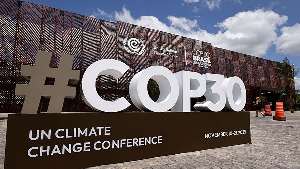At the 2025 United Nations Climate Change Conference (COP30) in Belém, Brazil, Ghana’s Minister of State for Climate Change and Sustainability issued a powerful call for global solidarity in confronting the mounting threats of sea-level rise.
Speaking at a high-level session titled “Addressing the Existential Threats Posed by Sea-Level Rise,” organised by the Global Center for Climate Mobility and UNOPS, the Minister underscored the urgent realities faced by coastal nations like Ghana.
“Coastal erosion, saltwater intrusion, and the loss of livelihoods are not future scenarios; they are realities we confront today,” the Minister said, describing how rising seas are already reshaping communities and ecosystems across Ghana’s 250-kilometre coastline, home to nearly a third of the population and 60 percent of industrial output.
Citing data from the Intergovernmental Panel on Climate Change (IPCC), the Minister warned that global sea levels have already risen by about 20 centimetres since 1900 and could climb by up to one metre by the end of the century if emissions remain unchecked. In Ghana, such a rise could result in the loss of up to 20 percent of land area, displacing more than five million people.
Outlining Ghana’s national response, the Minister highlighted ongoing efforts under the Integrated Coastal Zone Management programme, which focuses on mapping vulnerable areas, restoring mangroves, and constructing nature-based seawalls. Other initiatives include promoting salt-tolerant crops through climate-smart agriculture and supporting community-led relocation plans designed to preserve both livelihoods and cultural heritage.
The Minister also emphasised the importance of aligning Ghana’s Nationally Determined Contributions (NDCs) with global climate finance mechanisms, such as the Green Climate Fund, to strengthen adaptation efforts.
Calling for stronger regional and international cooperation, the Minister urged African Union members and UNFCCC partners to support a “Coastal Resilience Pact” for shared data, early warning systems, and direct financing to frontline communities.
“The current US$738 million loss and damage fund is a fraction of what is needed,” the Minister stressed. “Developed nations must honour their commitments and ensure that resources reach those most affected.”
Concluding the address, the Minister framed the crisis as both a grave challenge and a defining opportunity. “Sea-level rise is an existential threat, but it is also an opportunity to forge a new era of climate solidarity. Ghana is ready to lead and to partner, because the health of our coast is the health of our planet.”



